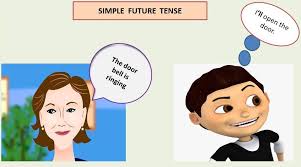Simple Future Tense
The sentence formation follows:
| Singular Number | Plural Number | |
| 1st Person | I shall/will = I’ll | We shall/will = We’ll |
| 2nd Person | You will/shall = You’ll | You will/shall = You’ll |
| 3rd Person | He will = He’ll | |
| She will = She’ll | They will = They’ll | |
| It will = It’ll |
Uses of The Simple Future Tense:
- It is used for simple future actions/commitments: We shall practice hard to win the competition. She will remember me forever.
- It is used with the point of time: Next Tuesday, our website will be functional. Next week, the government will clear all the pending dues of the recipients. Next month, we shall fly to the USA.
- It is used with In + Period: They will arrive in two hours. I shall return your book in a week.
- Going to Future: It is going to rain soon. Are you going to help me or not?
- We use ‘shall’
for determination and the same way the determination is normally expressed by
‘will’: Sometimes public speakers and others believe in using ‘shall’ instead
of ‘will’ to express the determination. They feel that it is a heavier word.
- I am sure you shall win this competition.
- You shall have your share after you complete your job.
- We will, we will rock you (a popular song, sung by Freddie Mercury, Queen).
- We will not (won’t) accept his terms under any circumstances.
- It is used
to express the speaker’s assumptions, opinions, speculations about the future.
Such sentences may be introduced by verbs, such as be afraid,
believe, assume, daresay, be/feel sure, expect, know, hope, doubt, think, suppose,
wonder. They may be accompanied by adverbs, such as probably,
perhaps, surely, possibly, but can also be used without them:
- (I’m sure) she’ll agree to this proposal
- (I suppose) they won’t be able to meet the deadline of the project.
- (Perhaps) you’ll find a better partner.
- They’ll (probably) come with us.
